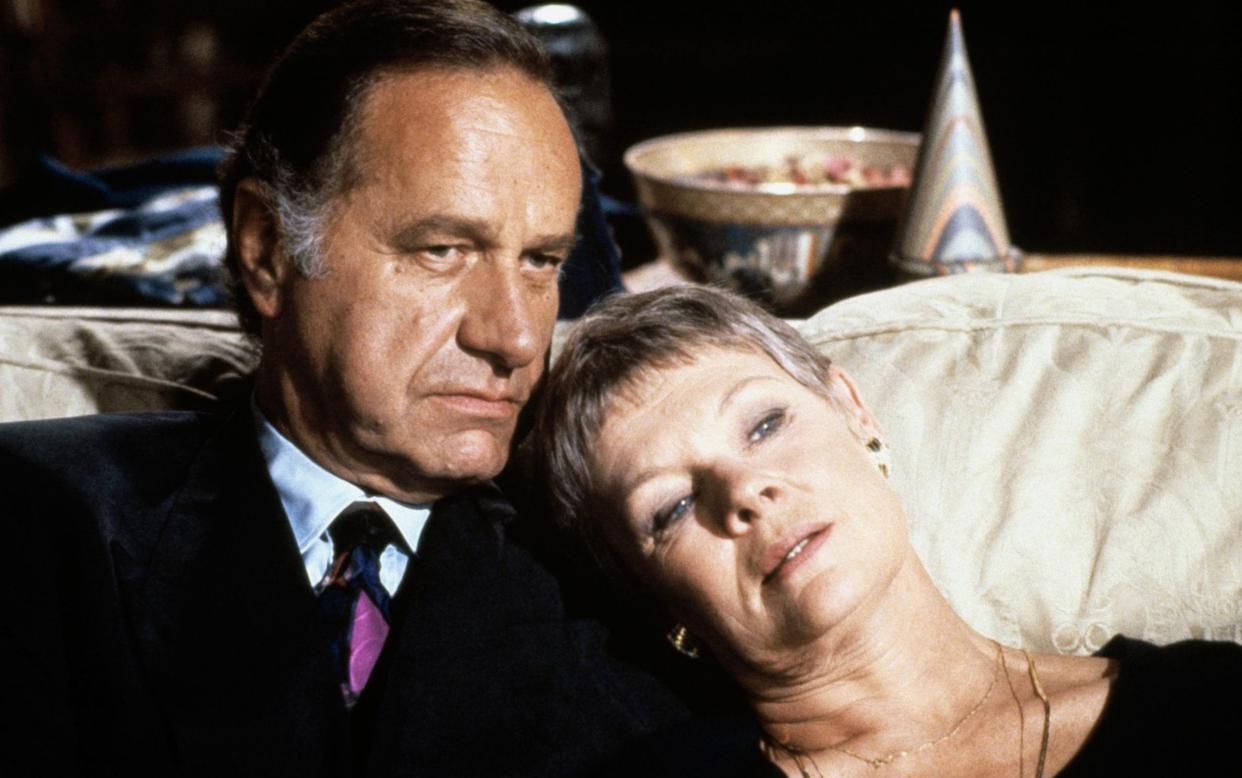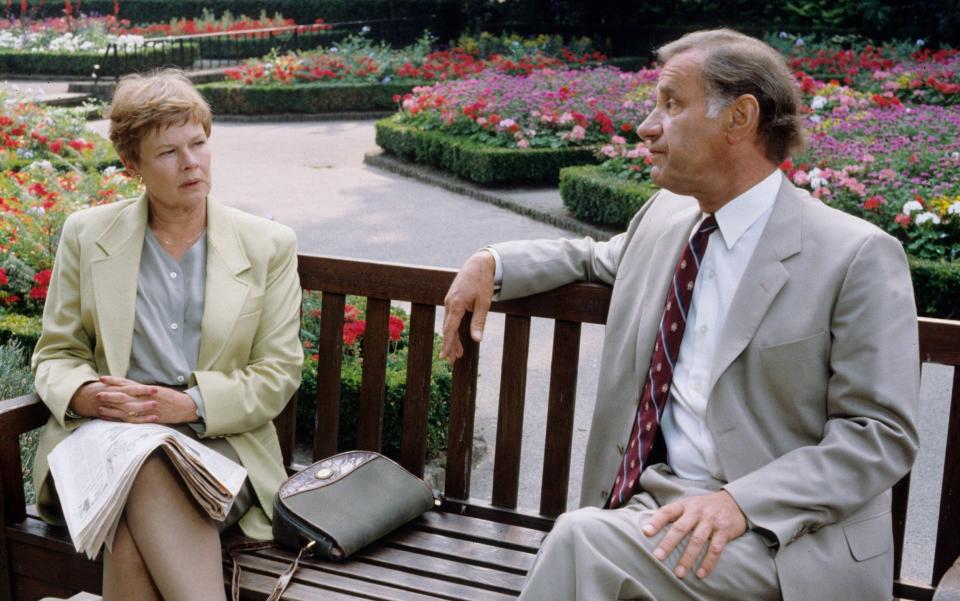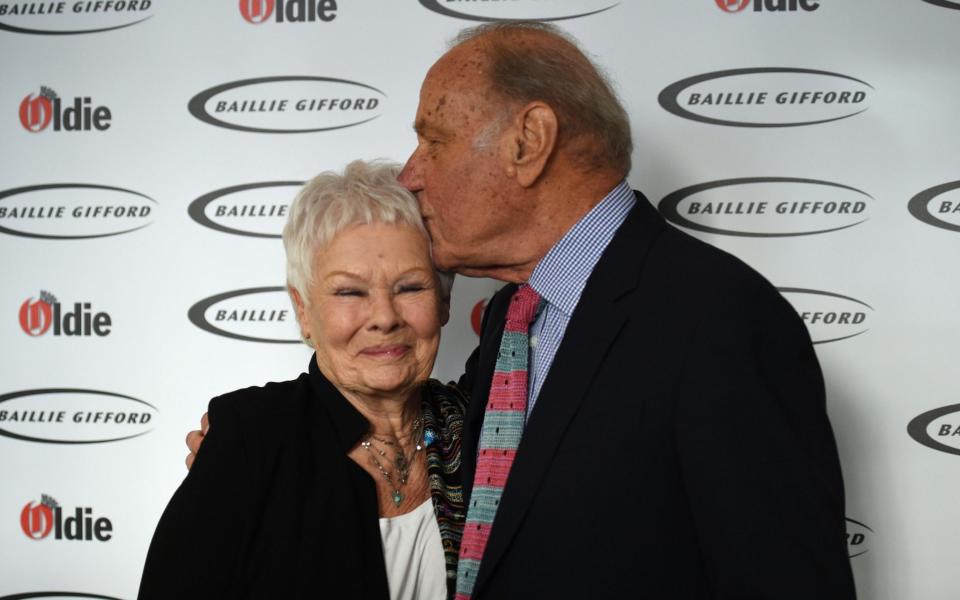As Time Goes By: Geoffrey Palmer, Judi Dench and a relationship that changed TV

In Tomorrow Never Dies, Pierce Brosnan’s second Bond adventure, Geoffrey Palmer cameoed as Admiral Roebuck. But Palmer wasn’t there to run the bally show, as stuffy commanders had by that point been doing in Bond films for 35 years – he was there for Dame Judi Dench’s M to get the better of him. (Dench was redressing the gender imbalance; one film prior, she’d branded 007 a “sexist, misogynist dinosaur”.)
Palmer, who died last week aged 93, was perfect fodder for Dench, with his bloodhound chops permanently hung somewhere between “beleaguered” and “surprised”. His casting was also a none-too-sly nod to Palmer and Dench’s pairing in the romantic BBC sitcom, As Time Goes By. It was an unlikely crossover: James Bond and the kind of cosy, living-room sitcom that edgier comedies from the Nineties and Noughties rebelled against.
Certainly, As Time Goes By is twee and gentle, but there was more to it than hollow studio laughs. As Time Goes By ran for nine series between 1992 and 2002, and returned for two Christmas specials in 2005. It notched up more episodes than the all-reigning Only Fools and Horses. The show was also a hit in America, where there was an online fan club for the series. In her autobiography, Dame Judi recalled that on one occasion, a fan-club more than 40 strong flew to watch her on stage in London.
The appeal – and success – of As Time Goes By was down to the undeniable chemistry between Palmer and Dench, born from a genuine affection between real-life friends. “Geoffrey and I hit it off from the word go,” said Dench in 2002. “The chemistry is either there or not, and it was with us from the first day of rehearsal.”
By the time they were paired up, Geoffrey Palmer was already a familiar face in British sitcoms. His naturally miserable demeanour was ripe for comedy. “I look miserable, which I don’t think I am,” he once said. “And I think that has been helpful in certain areas.”
He played Reginald Perrin’s incompetent brother-in-law, always dealing with a cock-up on such-and-such front (depending on what the latest, erm, cock up was); a ravenously hungry GP in Fawlty Towers (“I’m a doctor and I want my sausages”); a dullard husband in Butterflies, romantically out of his depth – a sentiment later echoed in As Time Goes By; and Field Marshal Haig in Blackadder Goes Forth, whose useless advice (“Put your underpants on your head and stick two pencils up your nose”) ultimately condemns Blackadder to go over the top.
Palmer’s comedy skill was to play it straight. “I don’t think comedy should be, ‘Look at me, I’m being funny,’” he said. “To me that is the kiss of death in comedy – someone consciously being funny.”
As Time Goes By was created by Colin Bostock-Smith, who wrote Metal Mickey and was a contributing writer for Not the Nine O’Clock News, among many other shows. Originally, it was called Winter with Flowers, which Bostock-Smith took from a German saying about finding love later in life. The BBC picked up the idea but hired Bob Larbey to write it and later changed the name. “I’ve never written a word of it… I didn’t even write the title,” said Bostock-Smith in 2008. But he secured a plum deal that paid him for every episode, of which there were an impressive 67. “I had a very nice contract that increased every series.”
Larbey had co-written The Good Life and Ever Decreasing Circles with John Esmonde. He also wrote the Eighties sitcom A Fine Romance, in which Judi Dench starred alongside her late husband, Michael Williams. As Time Goes By would be directed by Sydney Lotterby, who maintained much of the same crew for the show’s 13-year run. Dench’s part was originally intended for Jean Simmons, but the timings didn’t work out; Simmons went to America to film a mini-series and Dench was offered the role instead.

Palmer and Dench had met twice before, though in socially awkward circumstances. “We had not got off to a very good start,” Dench wrote in her book, And Furthermore. The first time they crossed paths, Dame Judi and her daughter Finty were in Chelsea’s General Trading Company. “I thought he was trying to pick me up,” wrote Dench about Palmer. “He said loudly, ‘I’d rather be anywhere in the world than here.’ He told me later that he didn’t say hello in case I did think he was trying to pick me up.” It's a misunderstanding befitting an early episode of As Time Goes By.
The second encounter was in the audience for An Evening with Peter Ustinov, where Dench gave her future pal a brisk telling off. A mutual friend of theirs, the actor Tenniel Evans, had previously told Palmer that he intended to become a lay priest, to which Palmer told him: “Rubbish, you mustn’t do that.” Having heard the story, and now sat in front of Palmer and his wife, Dench turned around and said: “I hear what you’ve done to Tenniel Evans. How dare you!”
As recalled in John Miller’s biography of Dench, Palmer still wanted Dench for As Time Goes By – despite the early awkwardness. When it looked like a schedule clash would prevent her from making the already-delayed series, Palmer told director Sydney Lotterby: “Look, Syd, this is b-----ks. I don’t want to do it without Judi. We’ve been hanging around for 18 months already, so what’s another little delay?”
The BBC delayed the filming for six months so Dench could take the role. Dench later said that she wanted the part so she could star opposite Palmer. “Because there is nobody with a drier sense of comedy,” wrote Dench. “He is a real master.”
As Time Goes By tells the story of Lionel Hardcastle (Palmer) and Jean Pargetter (Dench), lost sweethearts from the Fifties – back when they were a young soldier and nurse, respectively – reunited by a chance meeting 38 years later. Lionel was sent to the Korean War and wrote to Jean; but Jean never received the letter and assumed she’d been ditched.
After living as an expat in Kenya, Lionel returns to Britain to write about his experiences, and Jean is now a widow running a secretary agency. They meet again after Lionel arranges a date with Jean’s daughter (a slightly icky detail by 2020’s standards).
Amid the dalliances and the re-blossoming of their relationship in the early episodes, the writing is sharper than some would give credit to a mainstream studio sitcom from the time. It’s about black-and-white nostalgia – the title hints at the stolen, lost romance from Casablanca – complicated by the question of whether young love can happen later in life. Even Lionel’s not entirely sure at first. “Well, you have aged,” he says to Jean, a line that underlines the show’s smart commentary on age, awkwardness and sexual politics.
Both Lionel and Jean are utterly believable – familiar personas from Palmer and Dench’s other roles. Lionel appears to be a crotchety contrarian (“The older you get, the more there seems to be to get angry about”), but is an effusively likeable chap – his hangdog features more naturally warm than grumpy, his voice rich with sardonic melancholy. Jean, though spiky at first (her nickname in the office is “Iron Drawers”), isn’t defined by the men around her, but her own heart and integrity.
Dench found the process challenging. “Situation comedy is the most difficult thing I’ve ever done,” she wrote in Scenes of My Life. “You don’t get a preview, you get one chance to get it right.” The screen couple’s approaches were different but mutually complementary. Palmer would read the entire series of scripts up front; Dench would see scripts for the first time at the read-through of each episode.
“Acting with Judi is like playing football with Pele,” Palmer said. “It’s a whole different league.” Still, Dench credited Palmer with “fine-tuning” her timing for TV acting. “He thinks I do too much, and I try not to, but sometimes I can’t resist another look, or another double-take,” she said. “I’m always rather nervous when he comes to see me in a play, because he speaks his mind very much – and I quite like that.”
The first series of As Time Goes By attracted 12 million viewers; the BBC immediately commissioned a second series.
In 1997, Palmer and Dench appeared together in Tomorrow Never Dies. For one scene, in which M had to give him a dressing down, Dench commented it would have been more like “a dressing up” because Palmer was so much taller. Production made her a small hill-like platform so she could confront him eye-to-eye. “That was a good feeling,” Dench admitted.
Also in 1997, Dench played Queen Victoria in Mrs Brown (for which she was nominated for a Best Actress Oscar) and Palmer co-starred as Lord Henry Ponsonby. Biographer John Miller recalls there were questions about whether Palmer and Dench’s As Time Goes By association might be a distraction. But any sense of familiarity was hidden beneath Palmer’s Victorian whiskers.
In her book, Dench remembered Palmer giving her a facetious telling-off on Mrs Brown because she was word-perfect from day one. “Why can you do that for them, and not for Syd and me in As Time Goes By?” Palmer said. Dench reciprocated by reprimanding Palmer and Richard Pasco, who played Queen Victoria’s doctor, for getting big laughs during the preview screening just by looking at each other. “I think it’s outrageous that the two of you get so many laughs without saying anything. Please, do you mind? It’s my turn. I’m the Queen, you know.”
As Time Goes By continued until 2002. Lionel and Jean would marry; Jean’s twice-divorced daughter found happiness with Lionel’s yuppie publisher; and Jean would eventually read the lost letter that Lionel had sent to her all those years before – after they found it on display in the Imperial War Museum.
“We kept thinking we were doing the last series, but then Bob Larbey would write another one and Syd Lotterby always had such a lovely crew to work with,” wrote Dench. “Even after we finally called it a day in 2002, we were suddenly asked back to make two specials for Christmas 2005.”

The kinship between Palmer and Dench continued beyond the series. “I got so fed up with being told, ‘She’s a saint’, and she’s ‘lovely’, that I was kind of ready to hate her – because of this awful thing of being oversold,” Palmer once said. But in fact, he added, “I think of Judi as a great friend. Everybody who has ever worked with her thinks they’re great friends, and they are.”
In 2018, Dench presented Palmer with an ‘Oldie of the Year’ award. “‘I wish, wish, wish that this was the award for ‘Most Promising Newcomer’ or maybe even, ‘The Naughtiest Man I Ever Had the Pleasure to Work With,’” she told him. “But it’s not – it’s The Oldie Awards, Geoffrey.
“I’m going to quote Bernard Shaw – as he said about Ellen Terry, ‘She never seemed old to me.. Well, nor you to me.”
Speaking to Radio 4’s Front Row after Palmer’s death last week, Dame Judi said about As Time Goes By: “You would never think he would misbehave. There were a lot of outtakes. He got me into endless trouble… I have admired him all my life. How lucky to have been in something with him for so long.”
